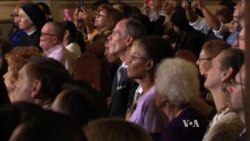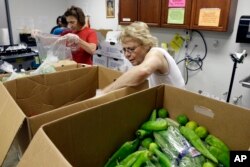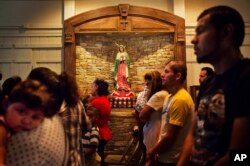One in five Americans is Roman Catholic, and Catholic voters, like other Americans, are politically divided. What issues concern them in this election year? Church leaders and activists describe areas of consensus, and questions of strategy and focus that divide them.
Combating discrimination and violence and reforming the criminal justice system: these are among the goals of Catholic social teaching, according to Jonathan Reyes of the U.S. Conference of Catholic Bishops.
The issues, and the principles that help Roman Catholics make decisions, are outlined in document from the bishops, called “Forming Consciences for Faithful Citizenship.”
Issues complex, principles clear
Reyes says a core concern is the sanctity of life, including opposition to abortion and euthanasia. In Catholic thought, both are called intrinsic evils, together with human cloning and the destruction of human embryos for research. The bishops also urge governments to end the death penalty, unjust wars and torture.
The issues are complex, but the principles behind them are clear, said Reyes.
“If it helps human dignity, we support it and we want to advance it. If it harms human dignity, we oppose it,” he said.
Church officials say Catholics give priority to society's most vulnerable members through a principle called the preferential option for the poor.
Monsignor Gregory Cox, executive director of Catholic Charities of Los Angeles, says the focus comes from his faith's Judaic roots and the Jewish emphasis on helping the widow and orphan. On a recent morning, Cox visited one of 22 Catholic Charities centers in Los Angeles where the poor come for food and social services.
“Sixteen percent of people in this country live below the poverty level,” said Cox. “That's a problem.”
He says Catholics are seeking a resolution to the plight of undocumented U.S. residents, a problem he called pressing in California, where several million people live in the shadows, at risk of deportation. “This is an issue that I think as a country, we also need to look at,” he said.
Helping those in need
Catholics say they are concerned with the plight of migrants from the Middle East and with balancing the need for U.S. security with the need of refugees for humane resettlement. These themes are part of a consensus, but Catholic voters diverge in their focus.
The group of activist nuns called NETWORK highlights social problems through the Nuns on the Bus project. Since 2012, they have conducted multi-state tours to publicize issues such as immigration reform and the role of big money in politics. The group's leaders have also criticized the church's male-dominated hierarchy.
The Vatican censured NETWORK and a larger organization of American Catholic nuns in 2012, questioning what church officials called their radical feminist ideas and lack of emphasis on issues like abortion. The nuns remain outspoken, however.
“Ordinary middle class folks and those at the bottom are losing ground in this economy,” said Sister Simone Campbell, NETWORK's executive director. The nuns reject the use of violence: “the way we have guns,” she said, “the way we think our foreign policy should be about the military, not diplomacy. We have got to find other ways forward.”
Political divisions
The U.S. visit of Pope Francis last September put many social issues into sharper focus and heartened American Catholics, including Campbell. U.S. Catholics, however, are politically divided. Slightly more than half lean toward Democrats, and just under half toward Republicans.
“There is no perfect party,” said Jonathan Reyes of the bishops' conference, noting that the parties “are not going to carry the water [do as people wish] on all the issues. That's not a reason to step back. It's all the more reason to engage and be agents of change,” he said.
Moreover, on policy questions, Reyes said there are legitimate debates about which approaches are effective.
American Catholics are as diverse as other Americans. For some, abortion and same-sex marriage are overriding issues, while others want policies that help the middle class and reduce poverty or reduce the size of government and empower business. Like other Americans, they are split over gun rights, health care and immigration.
The Pew Research Center finds that most American Catholics agree with their church leaders that abortion is sinful, but roughly six in 10 support gay marriage, despite official disapproval.
American Catholic leaders say that dialogue can shape the discussion and help achieve solutions, despite the divisions.
















